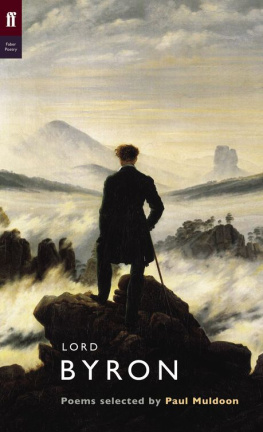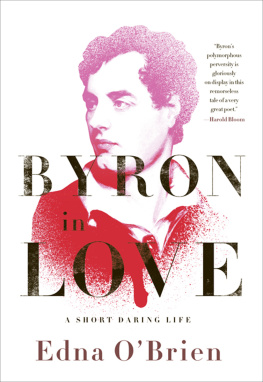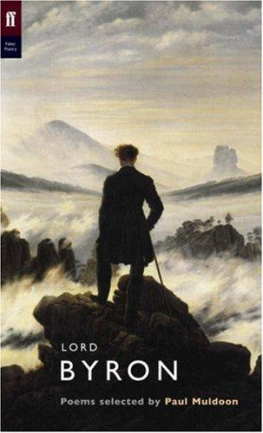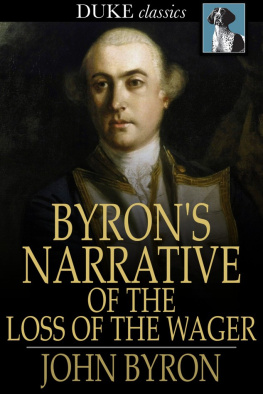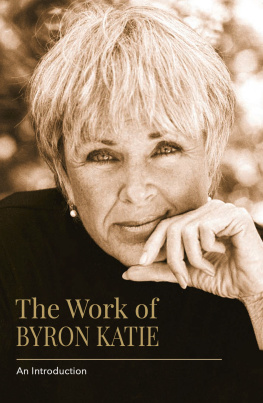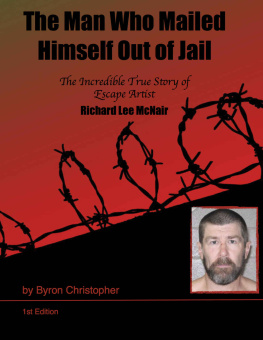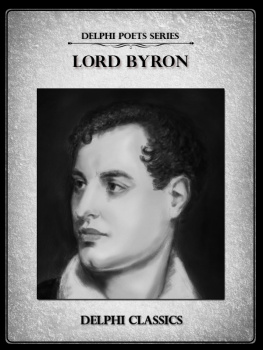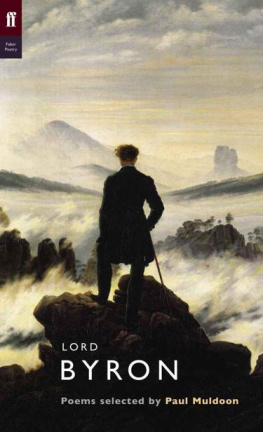Byron George Gordon Byron - Byron: child of passion, fool of fame
Here you can read online Byron George Gordon Byron - Byron: child of passion, fool of fame full text of the book (entire story) in english for free. Download pdf and epub, get meaning, cover and reviews about this ebook. City: New York, year: 2011, publisher: Knopf Doubleday Publishing Group;Vintage eBooks, genre: Non-fiction. Description of the work, (preface) as well as reviews are available. Best literature library LitArk.com created for fans of good reading and offers a wide selection of genres:
Romance novel
Science fiction
Adventure
Detective
Science
History
Home and family
Prose
Art
Politics
Computer
Non-fiction
Religion
Business
Children
Humor
Choose a favorite category and find really read worthwhile books. Enjoy immersion in the world of imagination, feel the emotions of the characters or learn something new for yourself, make an fascinating discovery.

- Book:Byron: child of passion, fool of fame
- Author:
- Publisher:Knopf Doubleday Publishing Group;Vintage eBooks
- Genre:
- Year:2011
- City:New York
- Rating:5 / 5
- Favourites:Add to favourites
- Your mark:
- 100
- 1
- 2
- 3
- 4
- 5
Byron: child of passion, fool of fame: summary, description and annotation
We offer to read an annotation, description, summary or preface (depends on what the author of the book "Byron: child of passion, fool of fame" wrote himself). If you haven't found the necessary information about the book — write in the comments, we will try to find it.
Byron George Gordon Byron: author's other books
Who wrote Byron: child of passion, fool of fame? Find out the surname, the name of the author of the book and a list of all author's works by series.
Byron: child of passion, fool of fame — read online for free the complete book (whole text) full work
Below is the text of the book, divided by pages. System saving the place of the last page read, allows you to conveniently read the book "Byron: child of passion, fool of fame" online for free, without having to search again every time where you left off. Put a bookmark, and you can go to the page where you finished reading at any time.
Font size:
Interval:
Bookmark:
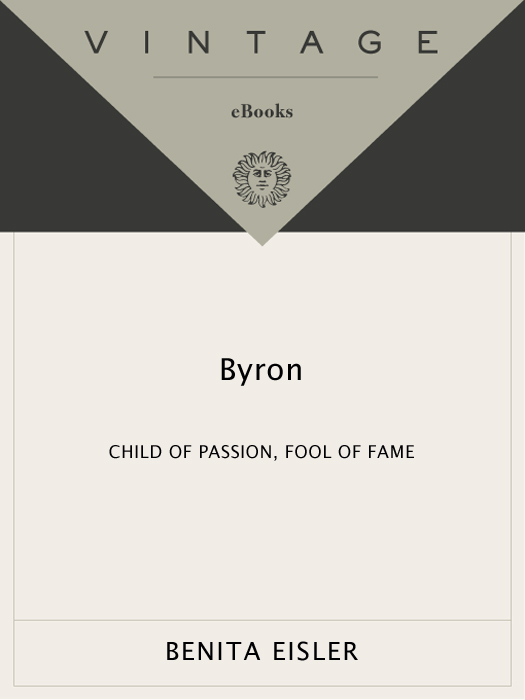
Acclaim for BENITA EISLERs
Byron
[Byrons story] has never been so well handled as it is now by Benita Eisler. The tale itself is always fascinating, occasionally astonishing, and intermittently horrific; the telling is uniformly shrewd, confident and non-judgmental.
Andrew Motion, Financial Times
A thrilling, enthralling, and sensitively detailed account of the life of one of Englands most talented and troubled artists.
The Atlanta Journal-Constitution
The strength of Eislers masterful biography lies in her rare insight into how the embattled poet distilled from his life of scandal and betrayal a literary art of soaring power. The many readers still attracted to this complex and multi-faceted poet will find no truer portrait. Booklist
Insightful an admirably full and well-balanced account of an extraordinarily crowded and dramatic life.
The Boston Globe
Perceptive readable and richly documented.
The Economist
Lively a page-turner. [Byrons] seesawing moods and volatile allegiances are reported with sensitive understanding.
The New York Times Book Review
A LSO BY B ENITA E ISLER
OKeeffe and Stieglitz: An American Romance
BENITA EISLER
Byron
Benita Eisler is the author of OKeeffe and Stieglitz: An American Romance. She lives in New York City.
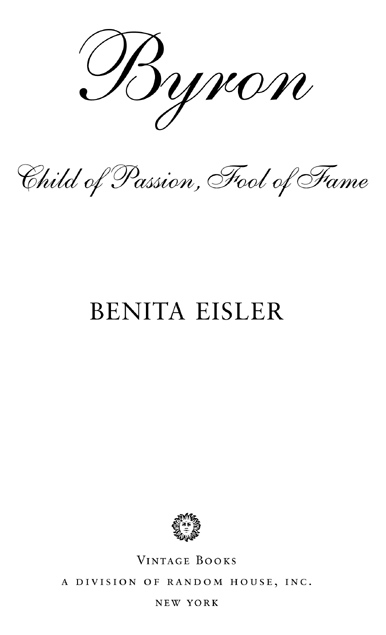
FIRST VINTAGE BOOKS EDITION, MAY 2000
Copyright1999 by Benita Eisler
All rights reserved under International and Pan-American Copyright Conventions. Published in the United States by Vintage Books, a division of Random House, Inc., New York, and simultaneously in Canada by Random House of Canada Limited, Toronto. Originally published in hardcover in the United States by Alfred A. Knopf, a division of Random House, Inc., New York, in 1999.
Vintage and colophon are registered trademarks of Random House, Inc.
Owing to limitations of space, all acknowledgments for permission to reprint previously published and unpublished material may be found following the index.
The Library of Congress has cataloged the Knopf edition as follows:
Eisler, Benita.
Byronchild of passion, fool of fame / Benita Eisler. I st ed.
p. cm.
eISBN: 978-0-307-77327-2
1. Byron, George Gordon Byron, Baron, 1788-1824.
2. Poets, English19th centuryBiography. I. Title.
PR 4381. E 37 1999
821.7dc21
[ B ] 98-35261
www.vintagebooks.com
v3.1
F OR G LORIA L OOMIS
Censure no more shall brand my humble name
The child of passion and the fool of fame
Cancelled lines from
Childish Recollections (1806)
O N M ONDAY , May 17, 1824, near noon, six men gathered in the high-ceilinged drawing room at 50 Albemarle Street, off Piccadilly, in a house that served as both home and office to the publisher John Murray. For days the group had been quarreling among themselves. Alliances shifted. Messages flew back and forth, and meetings between pairs continued through the morning. Once they were finally assembled, an argument flared between two of their number, John Cam Hobhouse, a rising young parliamentarian from a wealthy Bristol family, and Thomas Moore, a Dublin-born poet and grocers son. Angry words threatened to turn into physical violence. Finally, the decision of the host prevailed, and calm was restored. Murray then asked his sixteen-year-old son to join them. Introduced as heir to his fathers business, the boy was invited to witness a momentous event. A servant appeared, carrying two bound manuscript volumes. While the group drew closer to the fire blazing in the grate, two others, Wilmot Horton and Colonel Doyle, took the books and, tearing them apart, fed the pages, covered with handwriting familiar to all those present, to the crackling flames. Within minutes, the memoirs of George Gordon, sixth Lord Byron, were reduced to a mound of ashes.
Byron had been dead for one month to the day. The ship carrying the poets embalmed body (vital organs removed and packed separately) had taken four weeks to sail from Greece to England. In the interval, furious debates had exposed enmities old and new among those who were to be present at the burning of the manuscript. Quarreling had flared over the ownership of the manuscript, intensifying with arguments about potential damage to the poets already seamy reputation and the pain his unexpurgated memories would cause his former wife, their daughter, and his half sister. Each of the six men had his own stake in the dispute. John Cam Hobhouse, a Whig M.P. and Byrons executor and oldest friend, wanted only to sanitize the poets name for posterity. In the last years of his life, Byron had given his memoirs to his fellow poet Tom Moore. The needy Moore had, with Byrons approval, promptly sold the copyright to Murray. Then, at the burning, he tried to save the manuscript. But it was too late. Finally, Horton and Doyle, the two responsible for the actual destruction of the volumes, represented the interests of Lady Byron, the poets estranged wife and the mother of his child, and his half sister, Augusta Leigh, respectively.
The most timid of Gods booksellers, Byron had once called Murray, his publisher and now enthusiastic host of the auto-da-f. Still, the decision to destroy the most personal words of his best-selling author (which, in the event, Murray had not even read), weighed against the enormous profit potential of publishing the memoirs, underlines the fear that the known facts of Byrons life inspired in those who loved himand their horror of revelations yet unknown.
B YRONS FAME as a poet and his notoriety as a man were one; the scandals of his lifewhoring, marriage, adultery, incest, sodomybecame the text or subtext of his poems, made more shocking by the poets cynicism shading into blasphemy. The heroes of the poems might be pirates or princes, but Byrons voicethe passionate sorrowing youth turned world-weary libertinemade his works instant bestsellers. Editions of his first advertisement for himself, Childe Harolds Pilgrimage, sold out within three days. And this was not even the most frankly autobiographical of Byrons works. Penned from self-imposed exile in Italy, published in eagerly awaited installments, Don Juan delighted London gossipmongers with plentiful allusions to the scandal surrounding the poets divorce from his young wife of one year and his subsequent flight from English hypocrisy and cant. In the few years left to him, Byron added the glamour of revolutionary politics to his erotic and literary engagements. In exile, he joined the underground secret society called the Carbonari in the struggle to rid Italy of the Austrians, before dying at Missolonghi, bled to death by his doctors, while training troops for the liberation of Greece. Mourned throughout the world, the poet would not have shared the belief that his end was untimely. He had lived so hard and fast, he said, that before his death at age thirty-six, he felt himself to be an old man.
Indeed, the brief arc of his life spanned an era whose turbulence mirrored the poets own stormy existence. In 1788, the year of Byrons birth, George III succumbed to the first attack of madness, the violent symptoms of which required the appointment of his oldest son, the Prince of Wales, as Regent. The King regained his reason the following year and resumed power, but already the high living Prinnie and his dissolute friends had changed the tone of the court. Twenty years before he was officially declared Prince Regent, George Frederick Augustus of Hanovers indulgences in food, drink, gambling, and women, along with more durable interests in architecture and decor, ushered in the glittering froth of brilliance, luxury, and vice we know as the Regency. Its sensibilityat once restless, sensual, melancholy, and exuberantmight be characterized by a term invented a hundred years later to describe a strangely similar spirit:
Font size:
Interval:
Bookmark:
Similar books «Byron: child of passion, fool of fame»
Look at similar books to Byron: child of passion, fool of fame. We have selected literature similar in name and meaning in the hope of providing readers with more options to find new, interesting, not yet read works.
Discussion, reviews of the book Byron: child of passion, fool of fame and just readers' own opinions. Leave your comments, write what you think about the work, its meaning or the main characters. Specify what exactly you liked and what you didn't like, and why you think so.

